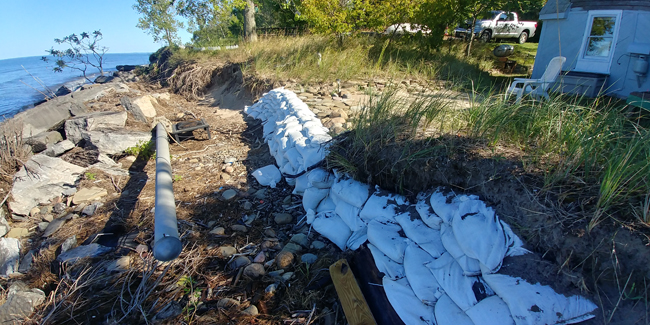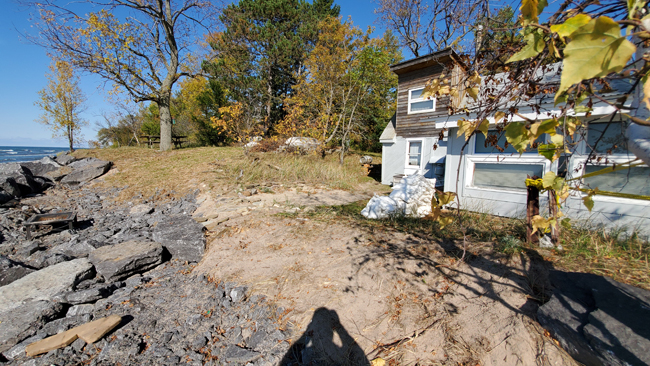Resources from NYSG helped a shoreline property owner make a well-informed decision for managing erosion along Lake Ontario
Contact:
Roy Widrig, NYSG Great Lakes Coastal Processes & Hazards Specialist, P: 315-312-3042, E: rlw294@cornell.edu
Oswego, NY, March 2, 2020 - After high water levels on Lake Ontario in 2017, much of a coastal dune along the shoreline near Mannsville, NY, in Jefferson County, was eroded. This put at risk a summer cottage, two neighboring properties, and a seasonal road. Work done in 2018 to repair the shoreline with rock rip-rap failed during a subsequent high water event in 2019. As a result, following an especially strong seiche event in June 2019, there was even greater erosion.
After attending a late August 2019 Great Lakes Shoreline Erosion Management workshop that was developed and hosted by New York Sea Grant (NYSG) in Webster, NY, one Lake Ontario property owner sought some advice from NYSG Great Lakes Coastal Processes and Hazards Specialist Roy Widrig.
This property owner requested a site visit to discuss erosion management options that September. He consulted the updated New York Great Lakes Shoreline Contractors fact sheet, and worked with a contractor to redesign his shoreline to provide greater protection against Lake Ontario erosion, without bringing in significant new construction materials to the site.
Because of NYSG’s efforts, the property owner had access to a combination of NYSG resources that enabled him to make a well-informed decision on managing his property on Lake Ontario. He applied the knowledge gained in the local workshop and found a contractor from the list of contractors supplied by NYSG. He also benefited from the Erosion Management for New York’s Great Lakes Shorelines document, published by NYSG in April of 2019.

One Lake Ontario property owner's shoreline before (above) and after (below) consulting with NYSG re: integrated shoreline management options. Credit: Roy Widrig, NYSG

Today, the shoreline of this property owner represents the NYSG integrated approach to shoreline erosion management:
• apply a step-by-step process of diagnosing a problem (shoreline erosion),
• facilitate consultation with experts (NYSG, contractors), and
• empower stakeholders (property owner) to make well-informed decisions based on science-based knowledge of shoreline erosion dynamics.
Download Erosion Management for New York’s Great Lakes Shorelines (pdf): www.nyseagrant.org/glcoastal > Publications > Erosion Processes
The Sea Grant Focus Area for this project is Resilient New York Communities and Economies.
More Info: New York Sea Grant
New York Sea Grant (NYSG), a cooperative program of Cornell University
and the State University of New York (SUNY), is one of 34 university-based
programs under the National Oceanic and Atmospheric Administration’s
National Sea Grant College Program.
Since 1971, NYSG has represented a statewide network of integrated
research, education and extension services promoting coastal community
economic vitality, environmental sustainability and citizen awareness
and understanding about the State’s marine and Great Lakes resources.
Through NYSG’s efforts, the combined talents of university scientists
and extension specialists help develop and transfer science-based
information to many coastal user groups—businesses and industries,
federal, state and local government decision-makers and agency managers,
educators, the media and the interested public.
The program maintains Great Lakes offices at Cornell University, SUNY
Buffalo, SUNY Oswego and the Wayne County Cooperative Extension office
in Newark. In the State's marine waters, NYSG has offices at Stony Brook
University in Long Island, Brooklyn College and Cornell Cooperative
Extension in NYC and Kingston in the Hudson Valley.
For updates on Sea Grant activities: www.nyseagrant.org has RSS, Facebook, Twitter, and YouTube links. NYSG offers a free e-list sign up via www.nyseagrant.org/nycoastlines for its flagship publication, NY Coastlines/Currents, which is published quarterly. Our program also produces an occasional e-newsletter,"NOAA Sea Grant's Social Media Review," via its blog, www.nyseagrant.org/blog.